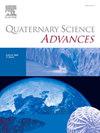Fault growth and rupture history based on displacement distribution along the Luoshan Fault, NW China
IF 2.2
Q2 GEOGRAPHY, PHYSICAL
引用次数: 0
Abstract
The growth and development of faults are driven by repetitive earthquakes, which accumulate displacement and extend rupture lengths. This process changes fault morphology, resulting in surface ruptures that are preserved in the geomorphology as displaced landforms. High-resolution geomorphic data enable the precise acquisition of these displaced landforms, facilitating detailed analysis of slip distributions along faults and offering quantitative constraints on the growth and rupture history of faults. In this study, an airborne light detection and ranging (LiDAR) system was employed to obtain 0.5-m resolution geomorphic data >500 m long on both sides of the Luoshan Fault on the northeastern Tibetan Plateau. By interpreting and distinguishing different geomorphic markers, we identified and measured 436 right-lateral offsets along the Luoshan Fault. Based on statistical analysis methods, we determined that there were six strong earthquakes within 10 m of the cumulative displacement along the Luoshan Fault. Except for the latest event, the other five strong events showed regular displacement increments of approximately 1.9 m, revealing a strong earthquake pattern of approximate characteristic slip. The different cumulative displacement distributions correspond to various stages of fault growth. The growth pattern of the Luoshan Fault evolves from fault tip propagation and linkage (Events 1–5) to a mode of growth with a constant fault length but increased cumulative displacement (Event 6). Based on the displacement distribution along the Luoshan Fault, the northern segment is more likely to experience earthquake events, with magnitudes ranging from Mw 6.84 to 7.12.
基于位移分布的罗山断裂带断裂生长与破裂史研究
断层的生长发育是由反复地震驱动的,这些地震积累了位移,延长了断裂长度。这一过程改变了断层形态,导致地表破裂,这些破裂作为移位的地貌保存在地貌学中。高分辨率的地貌数据可以精确获取这些位移地貌,便于对断层滑动分布进行详细分析,并为断层的生长和破裂历史提供定量约束。本研究利用机载光探测与测距(LiDAR)系统,对青藏高原东北部罗山断裂带两侧500 m长的0.5 m分辨率地貌数据进行了采集。通过对不同地貌标志的解释和区分,确定并测量了罗山断裂带的436个右侧偏移。利用统计分析方法,确定了沿罗山断裂带累计位移10 m范围内发生了6次强震。除最近一次强震外,其余5次强震均表现出约1.9 m的规律性位移增量,呈现出近似特征滑动的强震模式。不同的累积位移分布对应于断层发育的不同阶段。罗山断裂的发育模式由断裂尖端扩展联动(事件1-5)演变为断层长度不变但累积位移增大(事件6)的发育模式。根据罗山断裂的位移分布,北段发生地震的可能性较大,震级在Mw 6.84 ~ 7.12之间。
本文章由计算机程序翻译,如有差异,请以英文原文为准。
求助全文
约1分钟内获得全文
求助全文
来源期刊

Quaternary Science Advances
Earth and Planetary Sciences-Earth-Surface Processes
CiteScore
4.00
自引率
13.30%
发文量
16
审稿时长
61 days
 求助内容:
求助内容: 应助结果提醒方式:
应助结果提醒方式:


